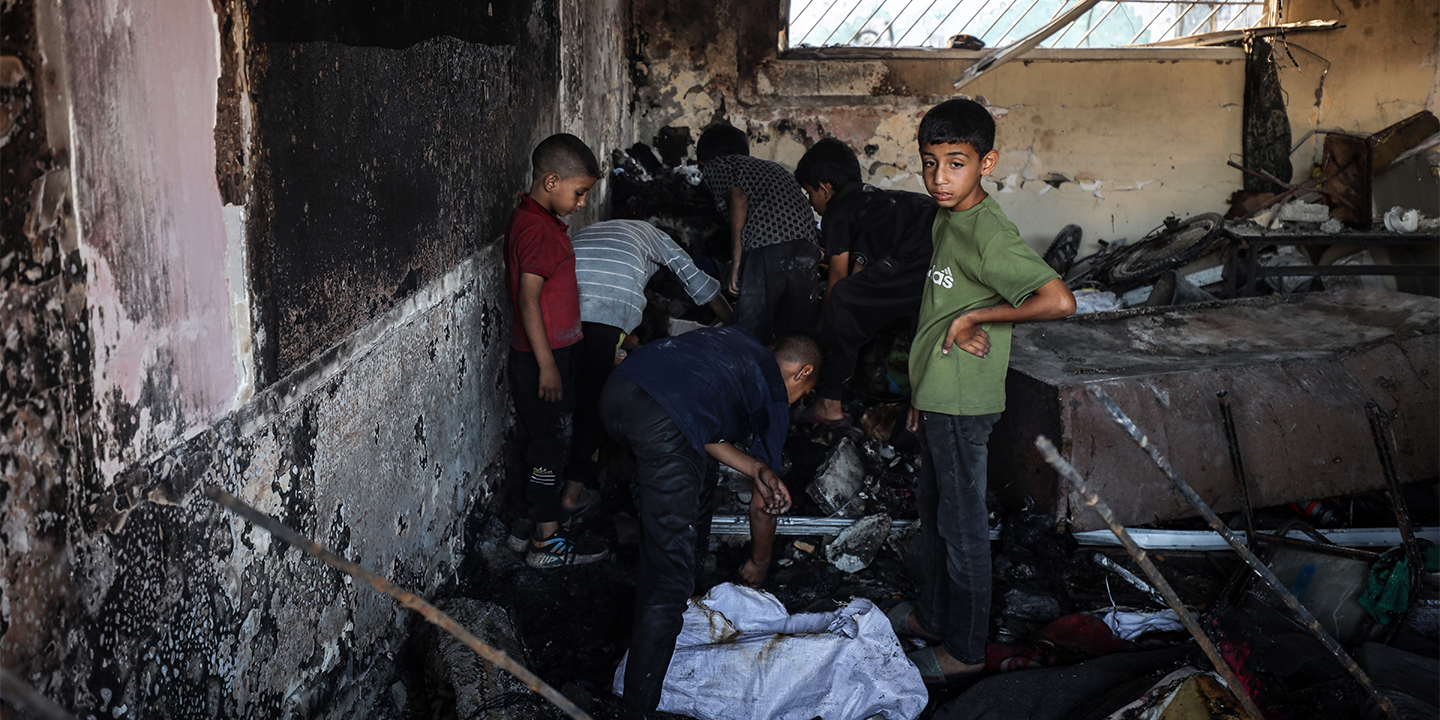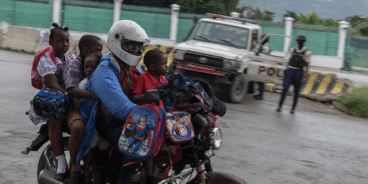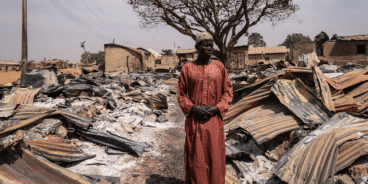

Atrocity Alert No. 450: Education Under Attack, Democratic Republic of the Congo and Syria
Atrocity Alert is a weekly publication by the Global Centre for the Responsibility to Protect highlighting situations where populations are at risk of, or are enduring, mass atrocity crimes.
EDUCATION UNDER UNPRECEDENTED ATTACK IN CONFLICT ZONES AROUND THE WORLD
Attacks on education in conflict zones have reached alarming levels, endangering students and teachers and threatening the futures of entire generations. Despite international legal protections, education facilities have been routinely bombed, burned or militarized, while students and teachers are killed, raped, threatened or abducted. Marking the International Day to Protect Education from Attack on 9 September, UN Secretary-General António Guterres stated, “No child should risk death to learn. Yet this year, as violence against children in armed conflict continues to climb to unprecedented levels, education is once again caught in the crossfire.”
According to the latest UN Secretary-General’s report on Children and Armed Conflict, 41,370 grave violations against school-age children were verified, leading to widespread death, abduction and trauma. Attacks on schools surged by 44 percent in 2024, with 1,265 education facilities targeted. The use of schools for military purposes, contrary to International Humanitarian Law, is also increasingly prevalent.
These violations affect all regions but are particularly heightened in atrocity situations, including in the Occupied Palestinian Territory (OPT), Myanmar (Burma), Haiti, Ukraine, Sudan and Afghanistan, among others. Education loss is one of the most devastating and enduring consequences of atrocity crimes, with many children never returning to school, leaving them vulnerable to exploitation and abuse. Approximately 85 million children living in crisis situations around the world are out of school.
This pattern is particularly stark in the OPT, where attacks on education have reached catastrophic levels. Several UN experts warn that the near-total destruction of Gaza’s education system – over 97 percent of schools damaged or destroyed – may amount to ‘scholasticide,’ a deliberate dismantling of the Palestinian education system. In June the UN Commission of Inquiry on the OPT, including East Jerusalem, and Israel reported that Israeli authorities had “obliterated Gaza’s education system” and that its attacks on educational facilities in the OPT were “part of a widespread and relentless assault against the Palestinian people in which Israeli forces have committed war crimes and the crime against humanity of extermination.”
In Sudan, nearly 13 million of the country’s 17 million school-age children are out of school in one of the world’s worst education crises, according to Save the Children. This includes about seven million children who are enrolled but are unable to attend due to conflict or displacement. In Myanmar, one of the deadliest attacks on schools since the February 2021 military coup occurred on 12 September, when an airstrike on a boarding school in Rakhine State killed at least 22 people, mostly students, and injured over 20 others. This latest attack demonstrates the junta’s increasing reliance on airpower to commit atrocities.
All UN member states should endorse and implement the Safe Schools Declaration and its Guidelines, taking all feasible measures to protect schools, teachers and children in accordance with international law. States must also strengthen monitoring, reporting and investigative mechanisms to ensure crimes affecting education are prosecuted. All parties to conflicts should strictly comply with UN Security Council Resolution 2601 on the protection of education during conflict, the first thematic resolution on attacks on education.
UN FACT-FINDING MISSION FINDS WAR CRIMES AND CRIMES AGAINST HUMANITY IN DR CONGO
On 5 September the UN’s Fact-Finding Mission (FFM) on the situation in North and South Kivu, Democratic Republic of the Congo (DRC), released its latest report, concluding that all parties have perpetrated serious violations of International Humanitarian Law that may constitute war crimes and/or crimes against humanity. UN High Commissioner for Human Rights Volker Türk condemned the findings, stating, “The atrocities described in this report are horrific. It is heartbreaking and deeply frustrating to witness, once again, the dehumanisation of the civilian population by those in power who are failing in their responsibilities.”
In early 2025 the March 23 Movement (M23) intensified its offensive in North and South Kivu, capturing provincial capitals and consolidating control over the mineral-rich region. The FFM found that M23 engaged in an organized campaign of intimidation and violent repression through a recurrent pattern of abuses targeting anyone perceived as opposing the group. The FFM concluded that there are reasonable grounds to believe that M23 likely committed the crimes against humanity of murder, severe deprivation of liberty, torture, rape and sexual slavery, enforced disappearance and deportation or forcible transfer. M23 members also systematically carried out widespread sexual violence, often coupled with torture and ill-treatment intended to “degrade, punish and break the dignity of the victims.”
According to the FFM, M23 received training, material, intelligence and operational support from the Rwandan Defence Forces (RDF). It noted credible allegations of covert RDF presence within M23. The FFM also documented grave violations by the Congolese government forces (FARDC) and allied militias, such as the Wazalendo. These include deliberate killings of civilians, widespread sexual violence, looting and the forcible recruitment and use of children.
With FARDC forces redeployed to counter M23, other armed groups have exploited the security vacuum. The Allied Democratic Forces (ADF) have carried out numerous deadly attacks in recent months, killing more than 152 civilians between July and August. On the night of 8-9 September, an ADF attack killed 72 people in the village of Ntoyo, North Kivu. A few days earlier, approximately 50 people were killed in another attack near Beni.
Rwanda should end all support to M23, withdraw its forces and ensure credible investigations into violations. The DRC must cease collaboration with abusive militias, uphold international law and hold perpetrators accountable. The international community must intensify pressure on both governments to halt support to armed groups, guarantee humanitarian access and prioritize genuine peace efforts. Accountability must be central to any peace process. This includes support for establishing the Human Rights Council-mandated Commission of Inquiry.
UN COMMISSION REPORTS LIKELY WAR CRIMES IN SYRIA’S COASTAL VIOLENCE
On 14 August the UN Independent International Commission of Inquiry (CoI) on the Syrian Arab Republic published its findings on the March violence, primarily across the coastal regions of Hama, Latakia and Tartus governorates. The violence, which predominantly targeted the Alawite minority group, involved grave acts that may amount to war crimes, including murder, torture and abductions. In reviewing incidental reports and interviewing survivors and witnesses, the CoI found that forces of the interim government, remnants loyal to the Bashar al-Assad government and private individuals were responsible for these acts.
The CoI investigated sites of massacres, including mass graves. During the violence, homes were raided and looted, families were questioned about their religious practices and many individuals were executed point-blank. Due to the instability following the wave of violence, several families were forced to keep the bodies of loved ones at home or leave them in the streets until burial was possible.
Meanwhile, the CoI has continued to receive reports of ongoing violations in numerous affected areas, warning that social media dissemination of footage from the coastal massacres has contributed to a “climate of fear and insecurity.” The CoI’s report comes shortly after violence escalated between armed Druze and Bedouin fighters in Suwayda city and surrounding areas in southern Syria. Dozens of Druze men and women were killed by interim government forces and affiliated members, according to Amnesty International.
As sectarian violence compounds Syria’s security vacuum, in a statement to mark the International Day of the Victims of Enforced Disappearances on 30 August, the Syrian Minister of Justice vowed that the matter of enforced disappearance remains a “national priority.” On the same day, the National Commission on the Missing established formal cooperation with several Syrian civil society organizations to support the documentation, identification and search for missing persons. While Syrians continue to grapple with the unknown fate of loved ones following decades of mass enforced disappearance – a hallmark of the Assad government’s tactics – Syrian rights organizations continue to document patterns of enforced disappearances and torture of detainees, albeit at a reduced scale. Hundreds of cases have been recorded since the political transition.
The interim Syrian authorities should actively facilitate inclusive national dialogues across the country, including engaging in confidence-building measures with communities across Syria, while taking decisive measures to curtail hate speech and dis-/mis-information campaigns. They must prioritize the protection of all Syrians and uphold guarantees of non-recurrence, through ensuring that interim Syrian security forces receive training in international human rights standards and are held accountable when responsible for violations.
Related Content


Atrocity Alert No. 470: Haiti, Israel and the Occupied Palestinian Territory and Venezuela
